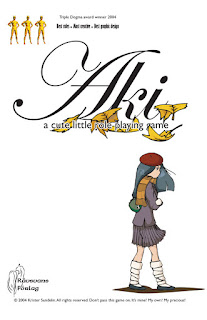Modern (anime, social)
Rävsvans Förlag
2004
Complexity: 1
Aki is a game inspired by slice-of-life shoujo manga… alright, well if anyone’s still here it’s a gave about ordinary life and social interactions--they are very clear on the point that there is nothing extraordinary and/or exciting, just relationships and stuff like that. It’s also apparently a “Triple Dogma award winner 2004” for best rules, most creative, and best graphic design. I can’t really find any information of the Dogma awards, but I assume it’s just a Swedish thing. Oh yeah, this game is Swedish, probably should have mentioned that. However I will be reviewing the English version, since as far as I know I do not speak Swedish--I do like Donald Duck though.
Character Creation: 2/5
Players make their characters my making up a number of good and bad ‘attributes’ using a point buy system. Each attribute has a ‘publicity value’ ranging from ‘hidden’ to public,’ which affects its cost. They also must select at least one ‘relation’ with another character, something like “secretly in love with Yamada-senpai.” Characters also get a number of goals that they want to achieve. That’s it, honestly I’m kinda meh about the whole thing.
Mechanics: 2/5
Aki is a totally diceless game, and you may have noticed that there are no numerically-defined attributes, which is somewhat odd for a role-playing game. So how do you do things? Well the game is mostly free-form, occasionally you will have the ability to get an attribute “in play.” Not one of your character’s attributes mind you, but an attribute of a character you have a relation with, provided that attribute is public enough for you to know about it. So let’s say Example-chan wants to initiate a scene with Yamada-senpai using his “president of the tennis club” attribute. She can do that because of her existing relation with Yamada-senpai and the publicity of that attribute. So let’s just say Example-chan decides to approach Yamada-senpai about joining the tennis club, the players--or player and GM--just role-play the scene and afterwards decide if the scene went in Example-chan’s favor or not--with the GM ruling if it’s unclear--earning either ‘upside’ or ‘downside’ points. At the end of an ‘episode’ downside points are subtracted from upside points--with extra points from accomplishing goals--and the points are spent on new or upgrading attributes.
Now, I’m generally in favor of more rules-lite games, but I think it’s important to evaluate what the rules are for. The way I see it, rules are there to prevent everything from going right, to occasionally throw a wrench into the players’ plans and force them to adapt to the situation. Failed to pick that lock? Well you’d better think of something else fast, ‘cause the guards are coming. Also they give more weight to successes. Just doing something because you said you did doesn’t have much meaning, but doing something when you know there’s an uncontrollable chance of failure feels much more like a success--even if that chance was only 5%. In this game all the rules do is restrict what you can do and how you do it. They don’t really provide anything that would make the experience better than role-playing without rules.
Writing: 2/3 [•]
So there’s quite a big of odd phrasing, which I assume is a result of being translated from Swedish to English, it’s nothing that makes the rules incomprehensible, you just might have to read things a couple times to figure it out.
Presentation: 3/5
The game looks nice--maybe not “best graphic design” nice--overall things are laid out in a way that looks neat and intentional. However, my old enemy the hyphenated word break does make a number of appearances, and you can’t really blame that on a language barrier. The graphics are minimal--just some autumn leaves blowing around the pages--but you don’t need a lot of graphics, you need to use the ones you have effectively. Which is what I think was done here. It’s also one of those things where it’s designed for print--in this case a single double-sided page folded in half--so it takes a second to orient yourself on how to be reading it. The character sheet is hideous, I don’t rate character sheets, but I just needed to say how much I don’t like it.
Final Remarks
Aki isn’t really faulty within its own context. However, the rules are so minimal that it makes them feel wholly unnecessary for creating the intended experience. There’s just nothing there to grab you and say “this is why this game is better than role-playing on a message board.”
Base Points: 7
Character Creation: 2/5, Mechanics: 2/5, Presentation: 3/5
Adjustments: +0
Setting: N/A, Writing: +0, Content: N.a
Overall Score: 47% (7/15 Points)
Kiss kiss roll to fall in love!
[Yes, I know there’s no rolls, but I’m probably not going to have another opportunity to make that joke.]

No comments:
Post a Comment